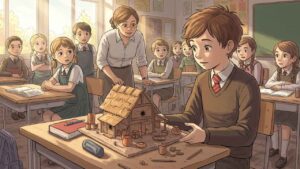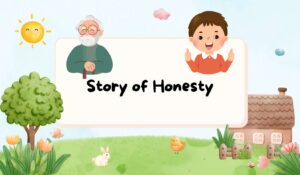20 Lines Short Stories with Moral: Hey beautiful people! in this post, today you will read These little stories that express important insights that speak to the complexity of human nature in just 20 lines. The tales participate as a compass, pointing readers toward the right decisions and their corresponding outcomes.
We are faced with universal realities that cut across cultural barriers as we make our way through the turns and turns of these short stories. This anthology presents a brief but powerful study of human values by fusing ethical thinking with simplicity. These tales become insightful lighthouses, encouraging awareness and motivating constructive change.
The Three Sons of Fortune
Once upon a time, three brothers set out on an adventure to find their fortune. Each of them took something special with them – a rooster, a scythe, and a cat.

The first brother traveled to an island where no one had ever seen a rooster before. The islanders were amazed when the rooster crowed and told them the time. They thought it was magical! In return for its special talent, they gave the first brother lots of shiny gold.
The second brother went to a village where the people didn’t have a tool called a scythe. They struggled to harvest their crops. The second brother showed them how the scythe worked, and they were so grateful that they gave him bags of gold in return.
The third brother arrived at a place full of mice. The people there had never seen a cat. When the cat started catching and chasing away the mice, the villagers were overjoyed. However, they got scared when they heard the cat meow. A wise man in the village asked the cat if it would leave the island. The cat meowed, and the villagers thought it said ‘no.’
Fearing the cat, the villagers decided to destroy the place to get rid of it. But the clever cat jumped out of the window and escaped without a scratch. And so, the three brothers each found success in their way, thanks to the rooster, the scythe, and the cat.
The moral of the story: Misunderstandings can lead to unnecessary problems.
King Grisly-Beard
Once upon a time, there was a princess who loved to make fun of the people who wanted to marry her. She called one suitor, a king, Grisly-Beard because of his long beard that looked like an old mop. Her father got really mad and said she had to marry the first person who walked through the door.

Two days later, a fiddler arrived, and the princess had to marry him. As they walked through woods and meadows, the fiddler told her they belonged to King Grisly-Beard. That’s when the princess realized she made a mistake.
The fiddler took her to a small cottage where she had to weave baskets, and it hurt her fingers. Later, she found a job as a maid in King Grisly-Beard’s palace. One day, the king wanted to dance with her, but she was scared and tried to run away.
King Grisly-Beard stopped her and revealed he was the fiddler she had married. He did all of this to teach her a lesson about her silly pride. The princess learned that making fun of others is not nice, and sometimes things are not what they seem.
The moral of the story: Don’t judge others by their appearance or make fun of them. Sometimes, things are not what they seem, and pride can lead to unexpected lessons.
The Riddle
Once upon a time, two friends got caught in a storm and found shelter in a witch’s hut. The witch, not very friendly, handed one of them a poisonous drink. Oops! It slipped from his hand and landed on a passing horse, and sadly, the horse died instantly.

As they were leaving, they thought it might be a good idea to take the raven that had come to eat the dead horse, just in case they couldn’t find food. Smart thinking, right?
When they reached an inn, they asked the cook to make raven soup. However, something went wrong. The raven had poison in its body, and twelve people who ate the soup fell sick.
Now, in a distant kingdom, there was a princess who loved riddles. The friends were brought before her, and she challenged them with a tough one. They asked, “What slew none and yet slew twelve?” The princess scratched her head, wondering if they might reveal the answer in their sleep.
That night, one of the friends pretended to be asleep and cleverly answered the riddle. The next morning, the princess told them the answer. But, the friends tricked her, saying she hadn’t solved the riddle but instead questioned him in their sleep.
The moral of the story: Be careful with tricky situations, and sometimes, the clever ones can outsmart even the smartest!
The True Bride
Once upon a time, there was a young girl with a mean stepmother. One day, the stepmother gave the girl a tough task—pick twelve pounds of feathers. It seemed impossible! But, a kind old woman appeared and promised to help. With her magic touch, they quickly gathered the feathers.

The next day, the stepmother had another tricky job for the girl—empty a whole pond with a spoon! Imagine that! Again, the old woman used her magic spoon to turn the water into vapor, making the impossible task easy.
On the third day, the stepmother asked for a castle to be built in a rocky valley. This time, too, the old woman worked her magic, and the castle was ready in no time.
Now, here comes the interesting part. A prince came to meet the girl, wanting to make her his princess. She kissed him on the cheek and gave him a special instruction—never let anyone else kiss him there. The prince left promising to return, but sadly, he never did.
Eventually, the girl heard that the prince was getting married to someone else. She decided to attend the celebration. At the party, she danced so beautifully that the prince forgot all about his new bride. When she kissed him on the cheek again, he remembered her and realized his mistake.
The prince and the girl got married, and from that day on, they lived happily ever after. The moral of the story is that sometimes, true love finds its way, even through tricky situations and misunderstandings.
The moral of the story: True love prevails, even in the face of challenges and misunderstandings.
Nixie of the Mill-Pond
Once upon a time, there was a water spirit named Nixie. Nixie made a deal with a miller, promising him wealth in exchange for what was born in his house that morning. When the miller returned home, he realized his wife had given birth to a boy.

As the boy grew up, he fell in love and married a girl from the village. One day, while the boy was drinking water from the pond, Nixie appeared and pulled him underwater. His wife searched everywhere for him, but he was nowhere to be found.
The next morning, an old woman appeared at the wife’s door. She shared a secret to bring her husband back – she had to sit near the river, spinning yarn under the full moon. The wife followed the advice, and to her amazement, her husband emerged from the pond.
But Nixie wasn’t done. She sent a huge wave that separated the couple again. Many years later, they met but didn’t recognize each other. When the woman shared her story, they both realized who they were. With joy and relief, they embraced and lived happily ever after.
The moral of the story: Love and perseverance can overcome even the most challenging obstacles.
We appreciate for reading the story from here🙂 if you really wanna get updated, You could also join us on Pinterest by clicking the link below.
- Pinterest: Click Here
- More Stories: Click Here
FAQs of 20 Lines Short Stories with Moral
What is a short story with a moral?
A short story with a moral is a brief story that conveys a lesson or ethical principle to the reader. These stories often focus on human behavior, values, and choices.
Why are short stories with morals important?
Short stories with morals are important because they can teach valuable lessons concisely and engagingly. They can help readers reflect on their own beliefs and actions, fostering personal growth and empathy.
Where can we find the best story in English?
You can find the best story in englishstory.in to read best stories.






